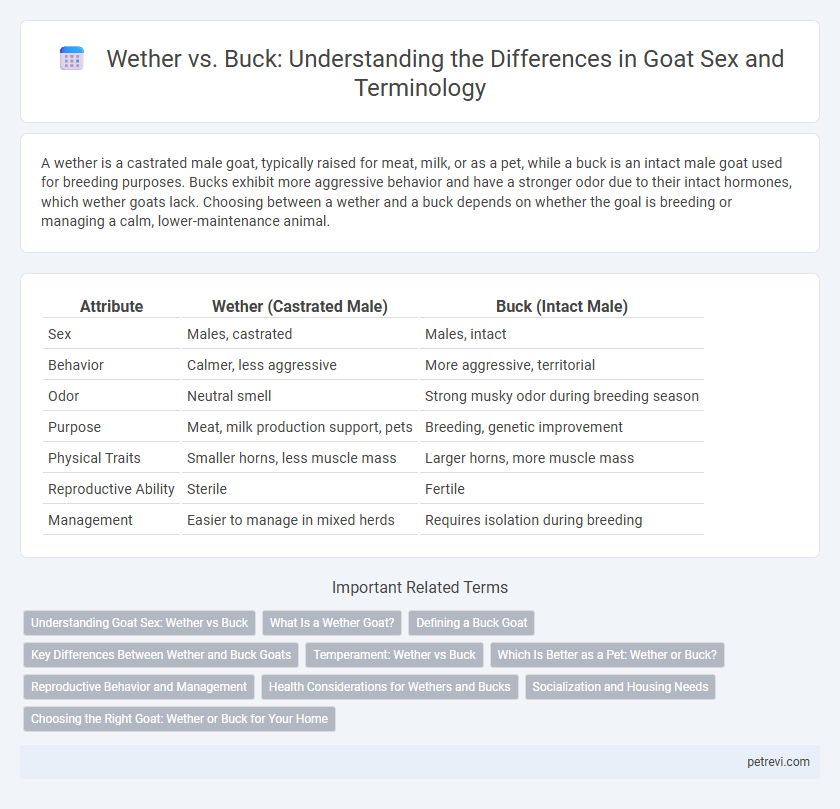A wether is a castrated male goat, typically raised for meat, milk, or as a pet, while a buck is an intact male goat used for breeding purposes. Bucks exhibit more aggressive behavior and have a stronger odor due to their intact hormones, which wether goats lack. Choosing between a wether and a buck depends on whether the goal is breeding or managing a calm, lower-maintenance animal.
Table of Comparison
| Attribute | Wether (Castrated Male) | Buck (Intact Male) |
|---|---|---|
| Sex | Males, castrated | Males, intact |
| Behavior | Calmer, less aggressive | More aggressive, territorial |
| Odor | Neutral smell | Strong musky odor during breeding season |
| Purpose | Meat, milk production support, pets | Breeding, genetic improvement |
| Physical Traits | Smaller horns, less muscle mass | Larger horns, more muscle mass |
| Reproductive Ability | Sterile | Fertile |
| Management | Easier to manage in mixed herds | Requires isolation during breeding |
Understanding Goat Sex: Wether vs Buck
Understanding goat sex involves distinguishing between wethers and bucks, as bucks are intact male goats capable of breeding, while wethers are castrated males typically raised for meat, fiber, or companionship. Bucks exhibit strong sexual behaviors and produce testosterone-driven characteristics, which influence herd dynamics and breeding management, whereas wethers lack these hormones and associated mating instincts. Proper identification and management of bucks and wethers are essential for effective goat reproduction control and herd health maintenance.
What Is a Wether Goat?
A wether goat is a male goat that has been castrated, primarily to manage behavior and improve meat quality. Unlike a buck, which is an intact male used for breeding, wethers are typically kept as companion animals or for milk production purposes without the risk of unwanted breeding. Castration in wethers reduces aggressive behaviors and eliminates the strong odor associated with bucks during mating season.
Defining a Buck Goat
A buck goat is an intact male goat primarily used for breeding purposes, characterized by the presence of strong secondary sexual traits such as a larger body size, a musky odor, and prominent horns. Unlike a wether, which is a castrated male goat, bucks retain reproductive capabilities and typically display more aggressive and territorial behavior. Defining a buck goat is essential for managing breeding programs and maintaining herd genetics in goat farming.
Key Differences Between Wether and Buck Goats
Wether goats are castrated males primarily used for meat, fiber, or as pets, exhibiting calmer behavior and reduced aggression compared to bucks. Bucks are intact males known for their strong odor during the breeding season, territorial behavior, and dominant instincts, vital for natural reproduction. The key differences between wethers and bucks include reproductive capability, hormonal influence on behavior, and management requirements within goat herds.
Temperament: Wether vs Buck
Wethers generally exhibit calmer and more docile temperaments compared to bucks, making them easier to handle and ideal for beginners or pet owners. Bucks tend to be more aggressive and territorial, especially during breeding season, displaying behaviors such as mounting and vocalizing loudly. Understanding these temperament differences is crucial for managing goats effectively in farming or homesteading environments.
Which Is Better as a Pet: Wether or Buck?
Wethers, being castrated male goats, generally make better pets compared to bucks due to their calmer temperament and reduced aggressive behavior, making them easier to handle and less territorial. Bucks, or intact males, exhibit strong odors during the breeding season and display more dominant behaviors, which can be challenging in a domestic setting. Choosing a wether as a pet offers a more manageable and companionable experience for goat owners seeking a friendly and low-maintenance animal.
Reproductive Behavior and Management
Wethers are castrated male goats and do not exhibit reproductive behaviors, making them unsuitable for breeding management but useful for controlling territorial and aggressive behaviors in a herd. Bucks, intact male goats, display strong sexual behaviors such as scent marking, vocalizations, and mounting, critical for successful reproduction and herd siring strategies. Effective reproductive management involves monitoring bucks' libido and health while using wethers for herd stability and non-breeding roles.
Health Considerations for Wethers and Bucks
Wethers, being castrated males, typically experience fewer health issues related to reproductive organs, reducing risks of infections and certain cancers common in bucks. Bucks retain their intact reproductive systems, which can lead to complications such as testicular infections and higher testosterone levels influencing aggressive behavior and seasonal health fluctuations. Proper management of bucks includes regular health checks and vaccinations to mitigate these risks, while wethers require less intensive reproductive health monitoring but still benefit from routine care to maintain overall wellbeing.
Socialization and Housing Needs
Wethers are castrated male goats known for their calm temperament, making them ideal for social housing with other goats or livestock. Bucks, intact males, often exhibit aggressive and territorial behavior, requiring separate enclosures to prevent fighting and stress among herd members. Proper housing ensures the safety and well-being of all goats, with wethers adapting well to communal living while bucks need more space and secure containment.
Choosing the Right Goat: Wether or Buck for Your Home
Choosing between a wether and a buck for your home depends on your goals; wethers are castrated males known for their gentle temperament and ease of care, making them ideal for pets or fiber production. Bucks, being intact males, are essential for breeding but require more management due to their strong odor and aggressive behavior during mating season. Considering space, purpose, and experience level ensures selecting the right goat type aligns with your needs and environment.
Wether vs Buck for Goat sex Infographic

 petrevi.com
petrevi.com